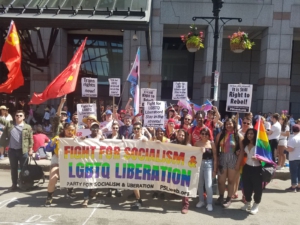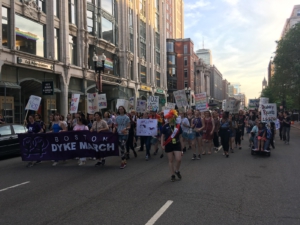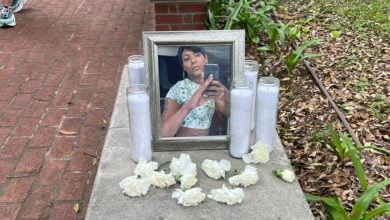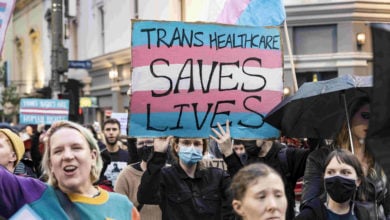Honoring the radical legacy of Stonewall at the Boston Pride Parade
Thousands of LGBTQ community members and their allies turned out on Saturday, June 8 to celebrate the 49th annual Boston Pride parade. The sun was shining as thousands of colorfully clad marchers traversed from Copley Square to City Hall Plaza, leading chants and interacting with the equally colorful crowd as they celebrated the history of struggle that has led to the current moment.
“Capitalism has attempted to co-opt Pride and make us forget the radical roots of this movement,” said Rachel Domond, a march participant and organizer with the Party for Socialism and Liberation. “We’re demonstrating so that those radical roots will not be forgotten. They need to be upheld as we continue forward.”
The origin of Pride goes back 50 years to the 1969 Stonewall Rebellion. The Stonewall Inn in lower Manhattan was a refuge for the oppressed LGBTQ community and was targeted nightly by violent police raids. But during the early hours of June 28, 1969, when police showed up to target Stonewall’s patrons again, they fought back. The movement was led by the most oppressed members of the LGBTQ community, including people of color, people experiencing homelessness and transgender activists. It is the seed that planted the modern LGBTQ movement, which militantly fought and continues to fight for the rights of millions across the United States and the world.

Before marching in Pride, organizers from the PSL spoke to a crowd of participants and spectators about the necessity of fighting for socialism to achieve full LGBTQ liberation; they highlighted the inherent oppression within the capitalist system that makes true liberation within the current two party “democracy” impossible. “The real way forward we can find in Stonewall itself, in recalling the determined, independent, and militant LGBTQ movement that took to the streets and shook up the whole country,” said Kimberly Barzola.
The PSL contingent marched through the streets to the beat of drums and led chants that recognized and celebrated Pride’s roots: “It’s our history, don’t deny it! Stonewall was a trans riot!”
The parade was a joyful and colorful celebration of how far the movement has come since 1969, but also served as a reminder of what is left to achieve. While the current presidential administration aims to erase the hard-won rights of vulnerable communities and co-opt what it cannot destroy, it is necessary to come together as a unified force and fight for true liberation for all. As PSL marcher JD put it: “There’s no socialism without LGBTQ liberation, and there’s no LGBTQ liberation without socialism!”
Boston Dyke March: ‘We’re all here, we’re all queer, we’re all in the fight for LGBTQ liberation’
In its 24th year, the Boston Dyke March brought thousands of LGBTQ persons and their allies together on the Boston Commons. In addition to marching, attendees danced, cheered on impassioned speakers and enjoyed a performance by local queer and transgender songwriter, Anjimile.

Since its inauguration in 1995, the Dyke March has occurred the evening before Boston’s Pride march. While it is the smaller of these sister events, the Dyke March has made a name for itself. Speakers emphasized that the march intentionally has no sponsors or corporate funding, priding itself as an entirely community-funded, volunteer-run effort. Grounded in the LGBTQ history of struggle, Boston Dyke March’s organizers characterized the event as all-inclusive and politically oriented.
Anti-capitalism and anti-oppression were central themes throughout the night. Signs touted by march goers focused on the particular oppression faced by LGBTQ people, such as one which read: “40% of homeless youth are LGBTQ+”. Immigration injustice, police brutality, gender inequities were also visible concerns. Lead speaker Lorelei Erisis spoke to the urgency of the current political moment:
“Even our bodily autonomy is under attack. If you aren’t white, cisgender and male, your right to decide what you do with your own body is actively being legistlated away. And while our allies are distracted, — fighting to preserve laws we assumed established and safe just a few short years ago — trans people, gender nonconfroming people, queer people and people of color are still being murdered and attacked in staggering numbers. Especially trans women. Especially trans women of color.”
The Dyke March is an important day of LGBTQ action in Boston. It is a memorial honoring the lives given and taken in the struggle for LGBTQ liberation, a celebration of the victories the struggle has won, and a refusal to proceed with life “as normal” in the midst of continued violent attacks on LGBTQ people.





